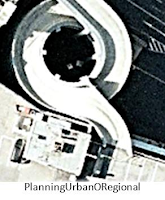Please visit my web page "Urban Tenets" at https://urbantenets.nl/
************************************************
One of the inherent limiting factor of long range
development vision, especially City or Metropolitan Development plan is
"Projection". While multiple alternate growth scenarios - like in
case of population projections- are assesses including business as usual,
exponential case scenario etc. through a scientific, statistical and pragmatic
approach, but soon afterwards while selecting the optimal case scenario out of
handful of alternatives, science tends to get replaced by somewhat abstract
sweeping logic and individual or herd preferences and usually a "bullish
scenario" is selected unanimously, because "vision" is perceived
to be bright and luminescent, and rest
other scenarios are sidelined.
Now very much convinced with the assumptions and choice of
decision, projected numbers (say derived future population) assume concrete
significance and starts dictating physical planning and form of city (like BUA,
FAR, PCU), but in actuality such numbers (say projected population) may or may
not be achieved or may exceed projected numbers, only to be evident half a
decade later or so. Over stressed city infrastructure and ghost cities both
are results of over reliance on single
final future scenario and discarding equally valid other possible scenarios.
It's worth acknowledging that a single market ready
technological advancement in span of 3 to 5 years, has potential to disrupt 30
odd year vision plan just like that.
Vision and long range planning should be as agile,
accomodative and resilient as possible; to be revisited, reinvented and
reconfigured in short intermediate spans and it should also have a monitoring
dashboard mechanism with a continuous feedback loop. Additionally, vision document must elaborate
and articulate multiple scenarios, their impacts and concrete response
measures, plan-B, Plan-C and so on.
Author: Anoop Jha



.jpg)


































